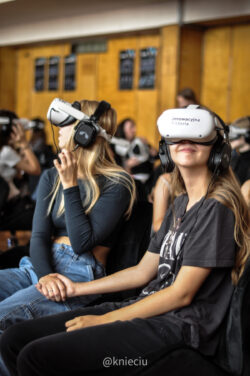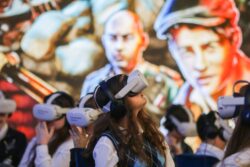The project „Innovative History – New Technologies in Education” is a unique initiative that has had a significant impact on the way historical knowledge is conveyed among primary and secondary school students in Poland.
The main project’s components are historical films in virtual reality technology, such as „Letter from the Uprising” and „Victoria 1920,” which transported viewers into the midst of the events of the Warsaw Uprising and the Polish-Bolshevik war. Additionally, the project included the Kolbe VR film, narrating episodes from the life of Father Maximilian Kolbe, with a focus on his time in the Auschwitz concentration camp.
VR technology, with imagery and sound encompassing 360 degrees, using dedicated goggles, allowed participants to experience history in an incredibly realistic way, providing them with a sense of direct participation in the events.

It is worth emphasizing that this form of education brought theoretical knowledge and also developed empathy and understanding for historical events. The project influenced the shaping of patriotic attitudes among children, enabling them to fully immerse themselves in national heritage.

As part of the project, presentations were also organized for teachers, providing them with theoretical knowledge about the benefits and risks associated with VR technology. The practical part focused on teaching the use of VR goggles and showcased examples of dedicated applications that can be used during lessons across various subjects. This allowed teachers to gain practical skills, enabling them to more effectively utilize VR technology in the teaching process, adapting it to the specificities of their subjects and classes.
The „Innovative History” project facilitated the acquisition of knowledge and opened up new possibilities for teaching, inspiring students on a fascinating journey into history using modern technologies.


